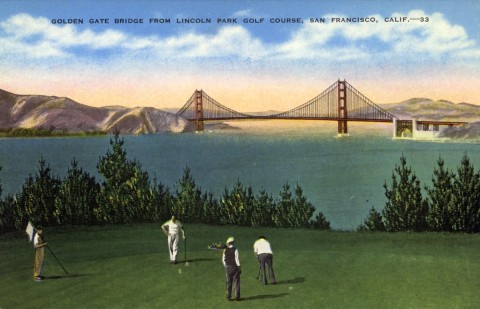Thanks to reader Sean for this Isabel Wade, Jill Lounsbury and Sally Stephens SF Chronicle complaint about San Francisco city golf courses.
They write that the San Francisco city courses are only at 40% of capacity, and therefore they need to be converted into hiking trails. Of course, that's a pretty good number, right? Much more and they'd be a mob scene. To put it another way, the hiking trails they want so badly would lose their appeal at 40% "capacity." No? Anyway...
A 2004 Recreation Assessment Survey conducted by a national consultant for the Recreation and Park Department recommends that the city build 35 more soccer fields to bridge the gap. Recreational needs in San Francisco today are far different than those of 50 years ago, according to the same 2004 study. Survey respondents ranked golf 16th out of 19 on a list of desired types of recreation. In contrast, 76 percent of respondents wanted more hiking trails, followed by more community gardens.
At the same time, a 2003 National Golf Foundation study showed that only 15 percent of golfers in America are minorities and only 23 percent of golfers are women.
Ah...I knew that was coming.
Golf hardly reflects the diversity of San Francisco compared to many other recreational activities that enjoy broader participation. In addition to hiking trails, city residents want more soccer fields, skate parks, basketball courts, lacrosse fields, dog runs and venues for Tai chi and disc-golf courses. Why aren't the needs of these users being fairly considered?
Venues for Tai chi? Don't they have enough Starbucks already?
There are many creative ideas for the use of one or more golf courses but the only option going to the Board of Supervisors is to lock up four golf courses under lease for 30 years. Sharp Park, the site of both a threatened and an endangered species, could be a wonderful nature center and restored wetland for the Bay Area, with new hiking trails open to all. Lincoln Park, right next door to the Presidio Golf Course, could be changed into a nine-hole course with the other half converted into a golf driving range. This would still leave acres for additional soccer fields, a dog run, hiking trails and perhaps an amazing event venue overlooking the Golden Gate Bridge and the Marin Headlands on what is now the 17th hole.
Oh yeah, the world needs another wedding chapel. Especially one where the weather is so benign and pleasant.













